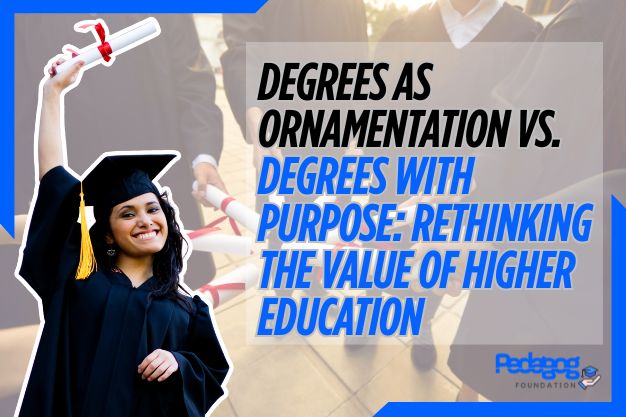As the job market changes rapidly and degrees are being examined more in-depth, we see a greater disparity between two types of degree holders—people who believe that having a degree is important due to the elite status conferred by holding a degree, and people who pursue degrees with specific intention related to their skills, related to their career and their ability to impact society. Following the concept described by Collins, those individuals who appear to regard diplomas as “decorative ornaments” are under the assumption that both employers and society regard diplomas over competency and skills attainment. It is this confusion over credentialing versus degrees that also leads to a phenomenon Collins termed “degree inflation” which has even extended to entry-level work (e.g., Alice could be hired regardless of hiring qualifications without a bachelor degree—e.g., degree demand is inflationary regardless of need) producing employers who are now not limited to looking for a number of entry level for “decorative” purposes (Fuller & Raman, 2017).
Ironically, as one observer noted that a degree could become a mere checkbox for employment instead of the primary reason for education, less emphasis and thus practical value was placed on both the intention of the educational experience and the meaning of the learning. On the other hand, “purposeful degrees” carry the distinct features of having learning outcomes—critical thinking, technical capabilities, and adaptability—that can articulate to what they possess in a new course (e.g., World Economic Forum, 2020). Research by Georgetown University’s Center on Education and the Workforce (Carnevale et al., 2021) clearly shows that young people who are thoughtful about choosing degrees with upwardly mobile potential (e.g., STEM, healthcare), tend to earn higher wages than those with qualifications in crowded or non-vocational fields. Further, one could argue that our pursuit of education goes beyond employability; it leverages civic engagement, ethical leadership and a passion for lifelong learning within the United Nations Educational, Scientific and Cultural Organization (UNESCO) ESD framework (2017). Some argue that the financialization of education – treating degrees as transactions instead of development – exacerbates students’ debts and void of any return or value with more than $1.7 trillion (Federal Reserve, 2023).
While opponents against financialization point to models that advance purposeful education, such as work-integrated learning (WIL) and competency-based education (CBE) that connect academic institutions with industry needs (AAC&U, 2017). Distinguishing ornamental and purposeful degrees ultimately unveils systemic inequities experienced by students; students who are particularly marginalised with institutions filled with students who don’t know better or feel compelled to make decisions related to post-secondary education that they don’t understand are more likely to end up underemployed on graduation (Burning Glass Technologies, 2019). To redefine the role of higher education, we must move towards an emphasis on experiential learning, mentorship, and skills-based career pathways as encouraged by Strada Education Network’s Beyond Completion report (2021). Employers can help by emphasizing skills-based hiring as well.
LinkedIn’s 2022 report reflected the growing trend away from degree hiring to skills-based hiring. This issue has broader implications. It recalls John Dewey’s Democracy and Education (2024), which observes that education is neither a process to develop workers nor a personal rite of passage, it is to engage citizenship. Ultimately, even if ornamental degrees will no longer be viable in a time of micro-credentials and AI processes in hiring (McKinsey, 2023), purposive degrees–vocational, intellectual, or civic–are in need of greater relevance now more than ever. In higher education’s future, there cannot be unintentional credentialism; we must emphasize intentionality. When people point to their diploma, they should think of it not as a reflection of the time they spent in formal education, but rather as a reflection of the value they created (Ivy Tech Community College, 2023).
References
Cheah, B., Carnevale, A. P., & Wenzinger, E. (2021). The college payoff more education doesn’t always mean more earnings.
Collins, R. (2019). The credential society: An historical sociology of education and stratification. Columbia University Press.
Dewey, J. (2024). Democracy and education. Columbia University Press.
Federal Reserve. (2023). Quarterly Report on Household Debt and Credit.
Fuller, J. B., & Raman, M. (2017). Dismissed by degrees: How degree inflation is undermining US competitiveness and hurting America’s middle class. Published by Accenture, Grads of Life, Harvard Business School.
Glass, B. (2019). The permanent detour: Underemployment’s long-term effects on the careers of college grads.
Holzer, H. J., & Baum, S. (2017). Making college work: Pathways to success for disadvantaged students. Brookings Institution Press.
LinkedIn. (2022). Global Talent Trends Report.
McKinsey & Company. (2023). The Future of Work: Skills and Degrees in the Age of AI.
Rieckmann, M. (2017). Education for sustainable development goals: Learning objectives. UNESCO publishing.
Strada Education Network. (2021). Beyond Completion.
Blog by
Dr. Rohit Kumar Pal
Senior Academician, Pedagog

